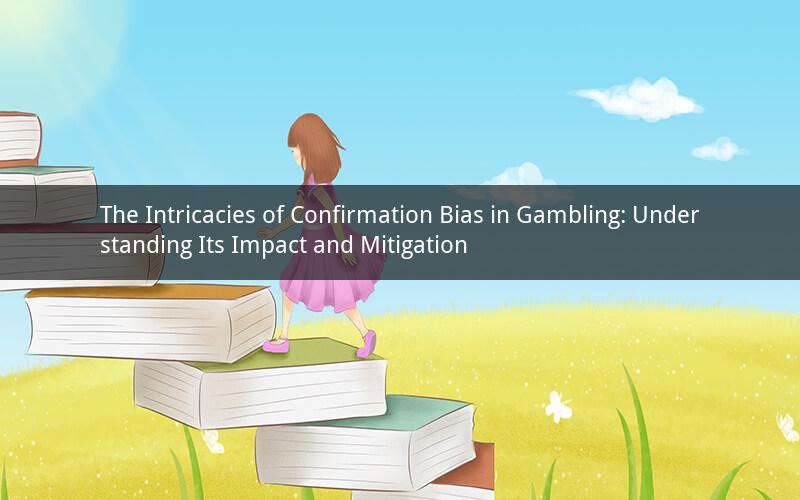
Introduction:
Confirmation bias is a cognitive bias that influences individuals to search for, interpret, and remember information in a way that confirms their preexisting beliefs or hypotheses. This bias is prevalent in various domains, including gambling. In this article, we will delve into the concept of confirmation bias in gambling, its implications, and potential ways to mitigate its effects.
Section 1: Understanding Confirmation Bias
1.1 Definition and Explanation
Confirmation bias is a cognitive tendency to favor information that supports one's preconceived notions or beliefs while disregarding or downplaying contradictory evidence. It can lead to a skewed perception of reality and hinder objective decision-making.
1.2 The Role of Confirmation Bias in Gambling
Gambling involves making decisions based on probabilities and odds. However, confirmation bias can significantly impact the gambling experience by influencing players' perceptions, choices, and outcomes.
Section 2: Confirmation Bias in Gambling: Examples and Implications
2.1 The Gambler's Fallacy
One of the most common manifestations of confirmation bias in gambling is the gambler's fallacy. This fallacy occurs when individuals believe that a random event is more likely to occur after a series of similar events have already happened. For example, a player might believe that a particular number on a roulette wheel is due to appear after several consecutive losses.
2.2 Overestimating Winning Chances
Confirmation bias can lead gamblers to overestimate their chances of winning. When players experience a few wins, they may become overconfident and believe that their winning streak will continue, ignoring the long-term probabilities.
2.3 The Impact on Decision-Making
Confirmation bias can impair decision-making in gambling by causing players to focus on favorable outcomes while ignoring negative ones. This skewed perception can lead to poor betting strategies and increased risk of financial loss.
Section 3: Mitigating Confirmation Bias in Gambling
3.1 Educating Gamblers about Confirmation Bias
One effective way to mitigate confirmation bias is by educating gamblers about its existence and potential impact. By raising awareness, players can become more critical of their beliefs and make more informed decisions.
3.2 Setting Realistic Expectations
Gamblers should understand that the odds of winning in most gambling games are stacked against them. By setting realistic expectations, players can avoid the disappointment and frustration that often accompany losses.
3.3 Implementing Responsible Gambling Practices
Adopting responsible gambling practices, such as setting limits on time and money spent, can help players maintain a level head and reduce the influence of confirmation bias.
3.4 Seeking Professional Advice
Consulting with gambling experts or counselors can provide gamblers with valuable insights and strategies to overcome confirmation bias and make more rational decisions.
Section 4: The Role of Technology in Addressing Confirmation Bias
4.1 Gamification of Learning
Technology can be utilized to gamify educational content about confirmation bias, making it more engaging and accessible for gamblers. By incorporating interactive elements, players can learn about the bias and its impact in a fun and interactive manner.
4.2 Data-Driven Analysis
Using data analytics, gambling platforms can identify patterns of confirmation bias among players and provide personalized recommendations to improve decision-making.
4.3 Real-Time Alerts and Warnings
Implementing real-time alerts and warnings can help players recognize and address their confirmation bias by providing objective information about the game's odds and probabilities.
Section 5: Conclusion
Confirmation bias is a pervasive cognitive bias that can significantly impact the gambling experience. By understanding its implications and adopting strategies to mitigate its effects, gamblers can make more informed decisions and reduce the risk of financial loss. Educating players about confirmation bias, setting realistic expectations, implementing responsible gambling practices, and leveraging technology can all contribute to a more balanced and enjoyable gambling experience.
Questions and Answers:
1. What is confirmation bias, and how does it affect gambling?
Confirmation bias is a cognitive tendency to favor information that confirms preexisting beliefs while disregarding contradictory evidence. In gambling, it can lead to skewed perceptions, overestimating winning chances, and impaired decision-making.
2. Can confirmation bias be mitigated in gambling?
Yes, confirmation bias can be mitigated by educating gamblers about its existence, setting realistic expectations, implementing responsible gambling practices, and seeking professional advice.
3. How can technology help address confirmation bias in gambling?
Technology can be used to gamify educational content, provide data-driven analysis, and implement real-time alerts and warnings to help players recognize and address their confirmation bias.
4. What is the gambler's fallacy, and how does it relate to confirmation bias?
The gambler's fallacy is a manifestation of confirmation bias where individuals believe that a random event is more likely to occur after a series of similar events have already happened. It can lead to poor decision-making and increased risk of financial loss.
5. How can gamblers set realistic expectations to mitigate confirmation bias?
Gamblers can set realistic expectations by understanding the long-term probabilities of winning in gambling games, avoiding overconfidence, and acknowledging that losses are a natural part of the gambling experience.